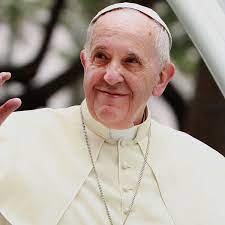Pope Francis has given his backing for a global ban on new exploration of oil and gas resources.
In the run up to CoP27 in Sharm el Sheikh, Egypt this autumn, the head of a claimed 1.2 billion Roman Catholics – one in eight of humanity – has added his support for the Fossil Fuel Non-Proliferation Initiative, already backed by a claimed 1,000 Nobel Laureates and 60 cities including London, Paris, Amsterdam and Sydney.
The FFNPI adopts the model of the worldwide nuclear non-proliferation treaty signed in 1968, and designed to head off the planet’s destruction by nuclear weapons.
Originated in 2016 by civil society activists and environmental campaigners in the south Pacific imperilled by rising sea levels, the FFNPI substitutes global destruction by intentionally extracted hydrocarbon fuels, in place of atomic annihilation.
The Argentinian-born pontiff, in his youth a trainee chemist and a technician in a food processing laboratory, was elected to the Holy See in 2013.
His endorsement of the proposed fossil fuel ban came last week in an announcement from the Vatican. Speaking for the Holy See’s communications office, Cardinal Michael Czerny, declared;
“Regarding CoP27, Pope Francis again joins scientists in holding to the Paris Agreement’s temperature increase goal of 1.5°C. The planet already is 1.2°C hotter, yet new fossil fuel projects every day accelerate our race towards the precipice. Enough is enough.
“All new exploration and production of coal, oil, and gas must immediately end, and existing production of fossil fuels must be urgently phased out,” said Cardinal Czerny, speaking with pontifical authority.
“This must be a just transition for impacted workers into environmentally sound alternatives. The proposed Fossil Fuel Non-Proliferation Treaty holds great promise to complement and enhance the Paris Agreement.”
Laudato Si, Pope Francis’ encyclical published in May 2015 is the Holy See’s most far-reaching call for humanity to acknowledge man made climate change, equating it as a sin putting humanity at greater distance from the universe’s creator.
Christians celebrate the five weeks from early September as Creationtide. Last week’s announcement quoted Pope Francis’s message for its opening day, in which he implores “the great extractive industries…to stop destroying forests, wetlands, and mountains, to stop polluting rivers and seas, to stop poisoning food and people”. The pontiff calls for “responsible cooperation between all nations” in fulfilling the goals of the Paris Agreement.
Well, well, well: Heavens above
Backers of the FFNPI allege that, in the past decade alone, coal, oil and gas have contributed 86% of planet-warming carbon emissions. Governments are still on track to emit by mid-century 10% more than they committed to Glasgow’s CoP26 in November.
Tzeporah Berman, Canadian environmentalist and chair of the initiative behind the Fossil Fuel Non-Proliferation Treaty, welcomed the Holy See’s support:
“What is needed now is moral courage. We welcome Cardinal Czerny as part of this growing choir of voices….all recognizing that expansion of fossil fuel production magnifies the climate crisis”, she declared.
“This is not a drill. We need urgent and bold action to slow the damage and put us on a more sustainable, just path.”
Later this year the FFNPTI will for the first time make public an open-source database of oil, gas and coal production worldwide, with reserves. It will be co-administered by London-based green finance advisers the Carbon Tracker Initiative.
On the Pope’s support for the FFNPI, Carbon Tracker founder Mark Campanale said:
“Science and economics have long pointed to fossil fuel production as the Achilles heel of the climate crisis. There is a finite science-based carbon budget to keep heating to no more than 1.5C, which means most fossil fuels need to remain in the ground. This vulnerability of a fossil fuel-based energy system can no longer be ignored.
“This latest endorsement from the Vatican makes it even harder for world leaders to ignore the central role of fossil fuels in the climate catastrophe unfolding around us”.




